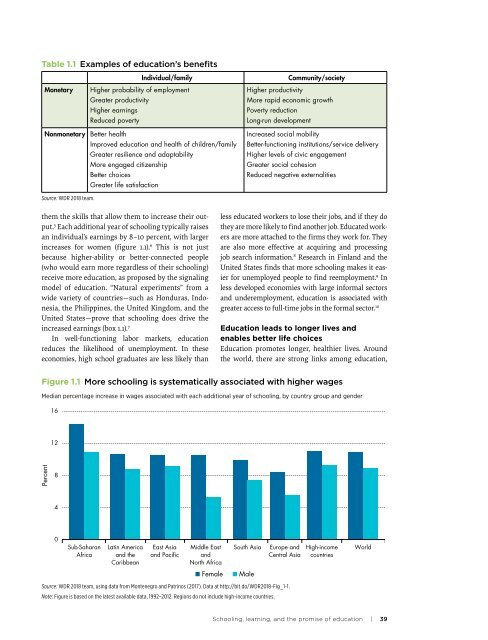Brasil só deve dominar Leitura em 260 anos, aponta estudo do Banco Mundial Relatorio Banco Mundial _Learning
Create successful ePaper yourself
Turn your PDF publications into a flip-book with our unique Google optimized e-Paper software.
Table 1.1 Examples of education’s benefits<br />
Monetary<br />
Individual/family<br />
Higher probability of <strong>em</strong>ployment<br />
Greater productivity<br />
Higher earnings<br />
Reduced poverty<br />
Community/society<br />
Higher productivity<br />
More rapid economic growth<br />
Poverty reduction<br />
Long-run <strong>deve</strong>lopment<br />
Nonmonetary Better health<br />
Improved education and health of children/family<br />
Greater resilience and adaptability<br />
More engaged citizenship<br />
Better choices<br />
Greater life satisfaction<br />
Increased social mobility<br />
Better-functioning institutions/service delivery<br />
Higher levels of civic engag<strong>em</strong>ent<br />
Greater social cohesion<br />
Reduced negative externalities<br />
Source: WDR 2018 team.<br />
th<strong>em</strong> the skills that allow th<strong>em</strong> to increase their output.<br />
5 Each additional year of schooling typically raises<br />
an individual’s earnings by 8–10 percent, with larger<br />
increases for women (figure 1.1). 6 This is not just<br />
because higher-ability or better-connected people<br />
(who would earn more regardless of their schooling)<br />
receive more education, as proposed by the signaling<br />
model of education. “Natural experiments” from a<br />
wide variety of countries—such as Honduras, In<strong>do</strong>nesia,<br />
the Philippines, the United King<strong>do</strong>m, and the<br />
United States—prove that schooling <strong>do</strong>es drive the<br />
increased earnings (box 1.1). 7<br />
In well-functioning labor markets, education<br />
reduces the likelihood of un<strong>em</strong>ployment. In these<br />
economies, high school graduates are less likely than<br />
less educated workers to lose their jobs, and if they <strong>do</strong><br />
they are more likely to find another job. Educated workers<br />
are more attached to the firms they work for. They<br />
are also more effective at acquiring and processing<br />
job search information. 8 Research in Finland and the<br />
United States finds that more schooling makes it easier<br />
for un<strong>em</strong>ployed people to find re<strong>em</strong>ployment. 9 In<br />
less <strong>deve</strong>loped economies with large informal sectors<br />
and under<strong>em</strong>ployment, education is associated with<br />
greater access to full-time jobs in the formal sector. 10<br />
Education leads to longer lives and<br />
enables better life choices<br />
Education promotes longer, healthier lives. Around<br />
the world, there are strong links among education,<br />
Figure 1.1 More schooling is syst<strong>em</strong>atically associated with higher wages<br />
Median percentage increase in wages associated with each additional year of schooling, by country group and gender<br />
16<br />
12<br />
Percent<br />
8<br />
4<br />
0<br />
Sub-Saharan<br />
Africa<br />
Latin America<br />
and the<br />
Caribbean<br />
East Asia<br />
and Pacific<br />
Middle East<br />
and<br />
North Africa<br />
South Asia<br />
Europe and<br />
Central Asia<br />
High-income<br />
countries<br />
World<br />
F<strong>em</strong>ale<br />
Male<br />
Source: WDR 2018 team, using data from Montenegro and Patrinos (2017). Data at http://bit.<strong>do</strong>/WDR2018-Fig_1-1.<br />
Note: Figure is based on the latest available data, 1992–2012. Regions <strong>do</strong> not include high-income countries.<br />
Schooling, learning, and the promise of education | 39








